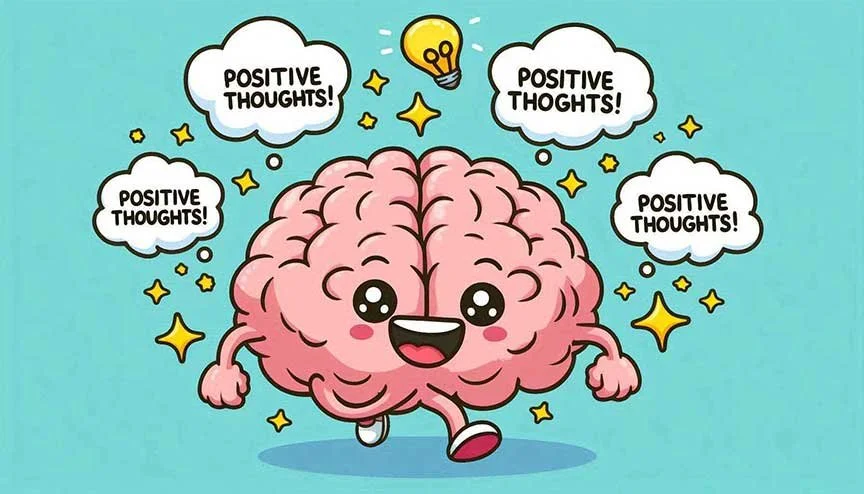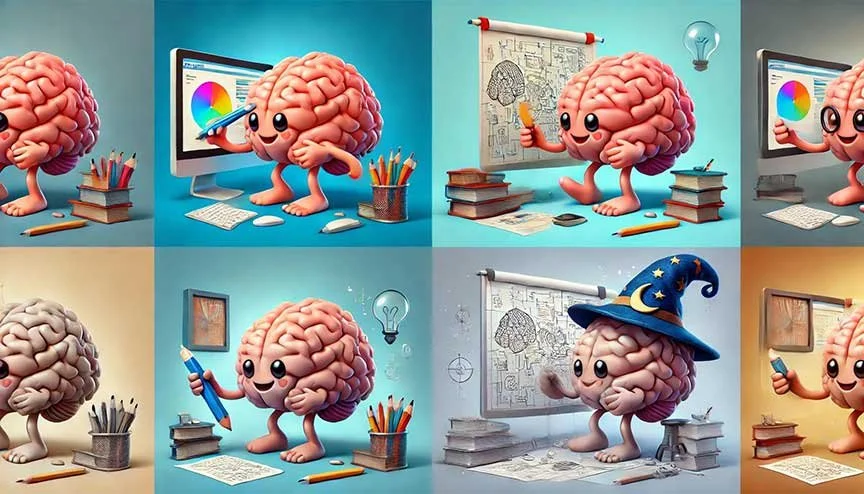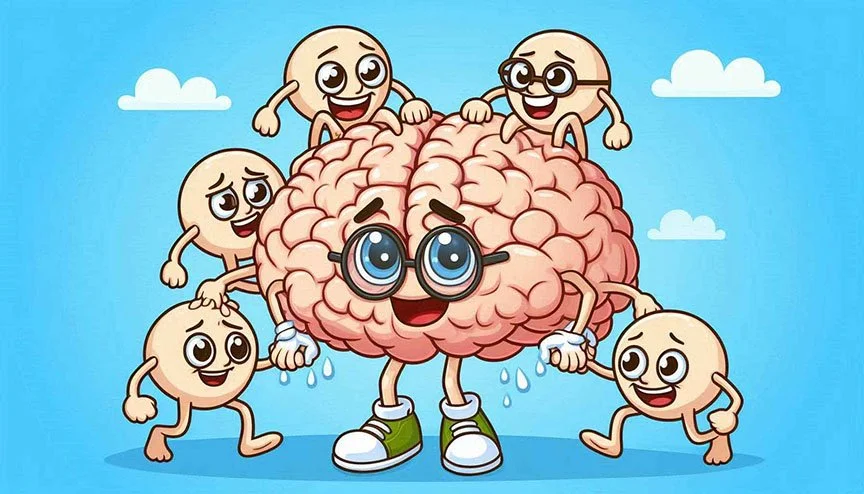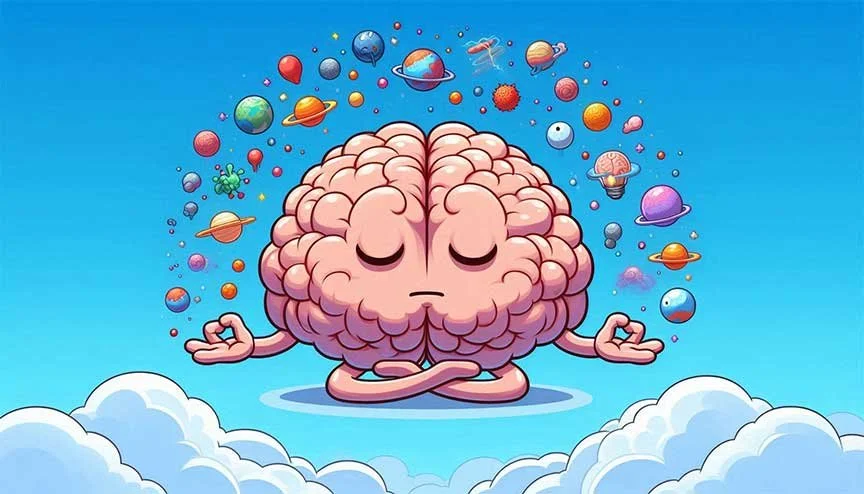Believe in Yourself: Cultivating Confidence and Self-Esteem with ADHD - Part 3
Living with ADHD can feel like an uphill battle against self-doubt and self-esteem. Our visions of ourselves can greatly impact our motivation. Many adults with ADHD struggle to maintain their confidence in themselves, especially when the challenges FEEL huge! However, with a bit of determination and simple strategies, you can slowly reclaim your confidence and start believing in yourself. This blog post will guide you through a few more strategies you can utilize to slowly bend your brain and your reality to your will!
If you haven’t read Part 1 of this three part post I highly recommend you go check that out. I cover the most common ways people with ADHD, especially adults, suffer from low confidence and self worth and explain how “reality” relates to your self-perception. This is the “mechanics of how the techniques in Part 2 and 3 actually work explained in simple terms.
Part 2: We’ve covered several techniques for improving your confidence and self-esteem with specific insights tailored to adults with ADHD. You’ll also get to see me in the hospital because I wasn’t practicing these techniques!
Past Experience Affects Your Self-Image
As previously discussed in Part 1, our self-image can be a very fragile thing when we don’t understand how it's generated and maintained. Unfortunately, we aren’t given much of a manual in our youth of how our brain works. And frankly, we’re still working on how the brain works! However, and to reiterate, our brains are prediction machines that guess at what we should be thinking and feeling fed by past information.
You know this to be true because you are constantly living within an expression of this behavior all the time by how you view yourself. What previous experiences have you had, over time, to tell your brain WHO you are? This is literally the pre-programming your brain follows.
Example: Do you believe you are “bad” at something based off your experiences in school? Did you perhaps have trouble studying for Chemistry 1C in college because you had undiagnosed ADHD? Maybe this led to a couple of poor grades on tests. Now your brain is going to tell you, “You’re bad at Chemistry and you should be super anxious for this test!” Imagine if you weren’t anxious and received study help. How much better could you have performed? Your brain did it’s best to make sense of what was going on a try to keep you safe. This could have been too much anxiety on chemistry tests and a belief of “I’m bad at chemistry” to keep you safe from that discomfort. Yet, maybe you just had trouble studying and controlling your anxiety on tests. Maybe you’re actually good at chemistry. But your brain doesn’t think so. (Yes, personal experience of mine in college.)
Improving self-esteem and self-image is a gradual process that requires consistent effort to shift your internal beliefs. This isn’t a race, despite how much you want it to be. Once you begin to let go of the burden of your limiting and possibly incorrect beliefs it can be much easier to start and maintain your motivation! Let’s look at some ways we can understand how our ADHD gets in the way and what we can do about it to get you out of your head and into DOING!
I had to switch AI generators! Look at all those brains working on their big goals!
Set Realistic Goals with ADHD to Improve Self-Worth
Setting realistic goals is actually pretty hard for all us human. As a Producer in the video game industry I learned a lot about estimating work accurately. The biggest problem with the accuracy part is the humans. For example, humans are greatly influenced by their emotions. If asked how long something may take, our answer could be influenced by our self-worth in the estimation. (People who believe they are really good at something often underestimate by a factor of 2-3!)
How ADHD Strengths can Impact Creating Realistic Goals
People with ADHD have more trouble regulating themselves PLUS that inherent human difficulty of estimating. This can lead to goals that are too ambitious due to our enthusiasm or out of the box thinking which can lead to frustration when the goal is not met soon enough. I discuss “realistic expectations more in depth in PART 1. Our ADHD strengths can make creating realistic goals seem impossible. I don’t know about you but the goals I create in my head are really sexy and it can be a struggle to make them realistic. Substitute “attainable” for realistic in the previous sentence and you can see the problem.
Us ADHDers are great at “over-expressing” ourselves in life. We can be “too enthusiastic” or “too motivated” in the wrong circumstances. These strengths of ours can actually hurt us when it comes to making realistic goals. So how do we keep ourselves in check, and better balanced with such strong strengths? Glad you asked!.
YOUR GREATEST GIFTS CAN BE FOUND IN YOUR GREATEST STRUGGLES.
I want to practice what I’m preaching here so let’s put some focus on how great our strengths are before we see how they can cause issues for us. Let’s reframe the problems we may face creating realistic goals as an over-expression of our strengths instead of just seeing all this as weakness:
Strength #1 - Enthusiasm / Zest / Joy / Excitement: When we get excited about something we really get excited. This can be very motivating to others around you if you happen to be on a team or group project. However, when this happens only in our little idea box, our brains, we can create fantastic projects and goals that aren’t very realistic with the means and time we have available to us. Coming back to reality can be deflating especially when our default dopamine levels cause us discomfort and low energy.
Strength # 2 - Creativity / Out of the box thinking / Divergent thinking: Our brains are generally pretty quick in connecting what may seem like disparate ideas to others. Have you ever felt like you were “connecting the dots” quickly and had to wait for everyone else to understand your point? It’s the people who don’t think like everyone else that come up with inventions or ideas that change the world. Many of them were on the spectrum! However, this again can make our goals get out of hand fairly quickly. These goals become so juicy it can be hard to bring them back to reality.
Strength # 3 - Motivation / Determination / Drive / Follow-Through: This one is a bit tricky to see as a strength right? When we are interested in something all these character strengths show up. We are those people…..at the right time, on the right subject, for an amount of time as our interest carries us. The problem is when our interest wanes or life gets in the way and we lose that motivation. Now that big idea you’re working on seems even farther out! It’s easier, and may feel better, to go back to the fantasy.
Did you spot the trend there about fantasy vs reality?
Creating Realistic Goals with ADHD means Turning Fantastic Ideas into Realistic Reality!
When all our creativity and daydreaming takes over we can soon find ourselves chasing after a fantasy. We do this because it feels good in our heads vs being potentially bored in real life. Couple this with your excitement over an idea and you are off to the races! The reality is, everything in your head is FANTASY until you begin to make it real externally. (Yes, there’s room to call what is in your head internal reality too but let’s keep this simple shall we?) Once you do so you can create a plan that is achievable. When you have realistic, or achievable plans you’re more likely to complete them. Completing a goal that you’ve challenged yourself with is exactly what we need to build that confidence up by proving you can do it. Your brain will then have some new past experience to create that new belief!!
Solution #1 - Write it Down: Start writing down EXACTLY what it is you want to accomplish. It may also help to verbally talk this out. This is you taking what is in your head and making it real. Once you’ve done this start writing out some of the steps needed to achieve your goal and how long you think they will take (and maybe how much they cost?). If you’re no longer motivated then maybe this was a fantasy or passing interest and not something you really want to do. Or, maybe not the right time? Thank your brain for the fun time and try to let the idea go. It might help to tell yourself, “I have great ideas routinely. I’ll have more and if this one was really meaningful then it will probably come back.”
Solution #2 - Use S.M.A.R.T Goals: Use this acronym and process to really define your goals.
Specific - EXACTLY what is it that you are trying to achieve?
Measurable - Use numbers! Quantify your outcome. so you can track your progress.
Achievable - Set a realistic goal to curtail that ADHD enthusiasm. Do you have time for this? Have you considered what this will take?
Relevant - Is this aligned with your current goals, values, and obligations in life?
Time-Bound - When will you be done? How long will you work on this? When will you work on it? No boundaries means this could go on forever?
ADHD Coach Insight about to do lists and overwhelm: Yeah this can happen when we’re making lists or steps needed to do the thing. Here’s a couple of tactics to try if you get overwhelmed with all the steps required to complete your goal. First, if you’re overwhelmed right now, take some time away from the list and come back. If it still feels overwhelming than maybe it’s too ambitious for right now. See if you can reduce it a bit or break it into smaller chunks of work. My second recommendation is to create the list without priority. Just a flat list to get your thoughts out. Then do what you want to do. We typically don’t do things in order because our ability is based on interest. I am certainly not building a coaching business by doing things in order!
FOCUS ON DOING. “THE RIGHT WAY” TO DO IT IS A CONSTRUCT OF BELIEF YOU PUT IN YOUR OWN WAY.
Build Self-Esteem and Confidence with ADHD by Focusing on Progress, not Outcomes
Many people get stuck on creating their own misery based on “not enough.” Aren’t you tired of that? How about trying something different? I know you want to complete this goal to feel good right? So why wait to feel good at the end when you could feel good the entire way there? Meaningful goals often take lots of time and energy. To sustain that energy focus on the fact you are, RIGHT NOW, doing that work towards that goal. This is being present with your progress in a positive way. Doing so also keeps you out of that fantasy in your head and keeps you from listening to the old negative thoughts. Oh, and you also have ammo to fight the negative thoughts. “I can too clean the kitchen! I just spent 30 minutes on it!”
Celebrate the fact that you put time and effort into something. Or, 1-hour on starting your new business. The point isn’t to get to the end. The point is to enjoy the progress you make while you are making it! This can create a sense of accomplishment and confidence to propel you forward! If you don’t take advantage of this aren’t you just sitting in the anxiety and suffering of “lack of completion?” That’s not fun is it?
Once you start practicing this present mindset of “what am I thinking / feeling / doing?” you’ll find working on your goals becomes easier as you’re constantly boosting your self-esteem vs waiting all the way until the end to feel good about yourself. Also, us ADHDers do get bored of projects. What have you done that you perceive as unfinished that required learning a new skill or knowledge? Could you look at it as “I learned something and am pretty good at that,” vs “I didn’t finish it?” How might you feel if you saw progress as proof of your abilities? (Personally, I never painted a whole army of Warhammer 40k guys but I got really good at painting the handful of figures I did complete!)
Here’s some mindset shifting statements I use often with my clients to put on your wall to build up that confidence:
“Everyone who ever did, started by trying.” - I literally just said this to a barista pouring my latte.
“Do or do not. There is no try.” - Yoda was right! Trying is like assuming you aren’t actually doing anything when you enact the action. The reality is the moment you try, you are doing. Leading back to the previous statement can we reframe “trying” as “trying is the process of doing?” Done happens at the end when you stop trying.
“Do you have to be a master at this to believe in your skills?” - People with ADHD tend to be “jack of all trades” people knowing many different skillsets. And bonus points here, we can get pretty deep in our interests and become better at a skill than the average person!
“I can make it good enough.” - The reality is your expectations can be a cage you put yourself in that creates anxiety and lack of self-worth. How long do you want to suffer? You can choose to create a realistic end point, even if just for now.
If you want to jump into the science of this there are plenty of interesting articles out there about motivation and presence with progress. I’ll link something at the bottom!
Surround Yourself with Positive Influences to Buttress your Self-Image
The people you spend time with can significantly impact your self-esteem. Unfortunately, when our self-esteem is low we may be more likely to seek comfort in others that are experiencing the same thing. This can happen because we naturally seek safety. And what’s safer than what we know? When this happens you can find yourself stuck in the comfort of others who “get you.” The problem is these people may also be experiencing your negative self talk and lack of motivation as well. Now you’re in an echo chamber of your brain’s negative thoughts. Let’s look at some criteria that may help you find “supportive” people to surround yourself with:
Look for People who believe in you - This is probably the most important thing to look for. You want to surround yourself with people who genuinely believe you can do that thing. You’re looking for people who say, literally, “You can do this!” The only caveat I’d add for the ADHDer is to be careful your RSD doesn’t get triggered if a supportive person brings up a weakness or problem you’re not seeing. They still have your best intentions and know that addressing our weaknesses is part of success!
Look for do’ers not complainers - Everyone experiences hardships in life. This is very much what life is about. Look for people who are actively doing something to address the hardships in their lives. A key indicator of a complainer is having the same conversation over and over again with the same person. This is a great indicator that they aren’t actually doing anything to solve their issues. If you do find someone who takes action you can then ask them “how did you do this?” You can’t ask that of the complainer.
Look for people who have what you want- You’re not going to learn how to do something from someone who hasn’t done it. As an example, I always made friends with artists that were “better” than me while in art school. Not only did they provide inspiration to be at their skill level but they also had practical tips and tricks based on accomplishments, not wishful thinking.
Look for supportive empaths - People who can feel what you are feeling are more likely to be supportive of you because they see themselves in you. If the people around you regularly say they believe in you, “you can do it”, or “I understand where you’re coming from, then they’re probably a good fit!” People who are empathic may also understand their perspective is unique and attenuate their support to you specifically.
Look for people who listen more than they speak - It’s very easy to give advice. People who are curious will listen more before advising so they have the full picture. My dad always said, “God gave you two ears and one mouth for a reason.”
Within this context it can be great to join a support group for exactly that….support. It’s hard being a people! There are plenty of ADHD communities and meet-ups that meet virtually full of people that understand your challenges and celebrate your successes. I’d still caution to use the above criteria when making friends as you can easily fall into the problem of complaining and not doing if you’re not careful.
BREAK FREE OF YOUR OWN LIMITS BY SURROUNDING YOURSELF WITH PEOPLE WHO HAVE BROKEN FREE OF THEIR OWN.
Seek Professional Help When Needed
Sometimes, building self-esteem requires more than self-help strategies. Working with an ADHD coach or therapist can provide you with personalized tools and support to overcome your challenges and build a positive self-image. “When needed” is something you may have to determine yourself. If you’re struggling to overcome your problems and you've developed a sense of hopelessness or lack of well then it’s definitely time for some outside perspectives to help you out. One problem us people have is we can often be blind to our own behaviors. It’s also not fun to have others point out our weaknesses. Reframing this a bit, ask yourself, “What type of person is willing to do the difficult work and ask for help AND see and accept their weaknesses?”
A STRONG PERSON THAT’S WHO! - Strong people do uncomfortable things. Brave people face discomfort and fear. It’s not fun. If it was everyone would do this type of work. However, it’s usually better on the other side. If you spent one moment today reframing any negative talk going on in that head of yours then I would suggest you are brave and strong. Being brave and strong is exhausting. No one does it all day. It’s okay to start small with one thought or action. Facing ourselves is some of the hardest work us people ever do. Remember, you’re not supposed to do all this alone. We are social creatures who thrive when we lift others and are lifted as well.
Conclusion:
There’s a lot that goes into the creation of YOU. It can feel complex often because it is. The act of building yourself back up and creating balance in yourself is something that takes time but can be trusted to work because you’re using the same rules of the game that created that lack of self-esteem in the first place.
By PAUSING more often during the day, literally moment to moment, you can better catch and shift any negative self talk that’s going on in that wonderful head of yours. I know it’s deflating at first because it’s hard. Developing new skills is hard and PAUSING more often to catch what you’re thinking, feeling, and doing is a skill all on it’s own you can get better at. I spent most of my life reacting based off a set of rules I didn’t know existed. Going deep into myself and looking at those rules and finding my poor self-esteem and all that fear was years of difficult work. Yet now I can look back on it and see proof of my abilities! And it took far less time to undo than it took to get there in the first place. I also can’t mention enough the power of support. Therapists, coaches, mentors, and friends all made a difference in my own growth and they can make that same difference for you too.
My last bit of Advice: Big Picture Thinking = Big Confidence. Maybe one of your goals is to work on your confidence and self-esteem which is how you found my posts. Us ADHDers can really over-focus on the present and miss the big picture. Let’s practice a quick PAUSE to see all that you’re doing by reading this post. There’s more going on here than you may be aware of.
Think about how you’re actually working on yourself, your problems, your issues, and maybe a goal. You are now a person who has goals and aspirations. Not everyone does. (Sadly) You’re also a person with a neurological disorder tackling their weakness possibly by making S.M.A.R.T. goals! You’re also a person who continues to plug away at your goal in all the small ways that add up. Where did that persistence come from? You’re a determined person. How could that feel to let that in? Maybe if you let it in just now you could say you’re being a mindful person being present with your successes minute to minute instead of waiting until you’re done! Maybe you’re not even getting much done on your goal so you sit down to find that issue and solve it. You’re now solving your issues as you encounter them! Did you not get much done on your goal this week so you reached out to a friend, blog posts, coach, or therapist for support? You’re a person who knows what they might need and actually did it!
The big point I’m trying to make is don’t take yourself for granted. You have strengths and weaknesses and your ability to pay attention to, mitigate, and utilize these traits is sexy as fuck!
Build Confidence and Self-Worth with the Help of an ADHD Coach
If you’ve got the motivation and need some help utilizing all these techniques then maybe it’s time to work with a Coach who’s been there and loves to help! (Plus, look how awesome you are tackling that hard work by asking for help!) None of us do this alone, and neither should you. It’s hard being a people. We shine the brightest when we support others and are supported ourselves .
Additional Reading:
How Long Term Memory Works - A great, short, article about types of memory and their fragility. The inaccuracies of our brain are pointed out a few times!
Do or Do Not There is No Try: The Meaning And Importance Of Yoda’s Famous Quote - This extrapolates a few other important points about intention and remarks on creating realistic goals.
Celebrate the small stuff - According to research by Teresa Amabile from Harvard Business School, people who tracked their small achievements every day enhanced their motivation. Motivation? Yes please more of that!
How ADHD Ignites RSD: Meaning & Medication Solutions - I mentioned Rejections Sensitivity Dysphoria in this post earlier. This specific symptom of ADHD can keep you from taking advice from others so it’s important to understand it!
Self-Motivation Explained + 100 Ways To Motivate Yourself - Tons more on motivation and other ways to foster it. I love this site but they can be a bit heavy handed selling you things. Keep that in mind if you share your email.






